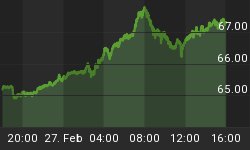With the utterance of one word, "patience" in reference to the Fed's anticipated lift off date from its zero bound interest rate target, Janet Yellen sent the Dow Jones soaring over 700 points in two days. It is clearly evident that our central bank is finding endless excuses not to raise interest rates in an effort to keep the equity and bond bubble rolling along. But this entrenched addiction to free money has now set the economy up for a catastrophe. The Fed's $3.7 trillion dollars in QE and six years of ZIRP have created massive economic imbalances. When interest rate normalization eventually occurs, it will lead to wide spread insolvency.
The following is just one example...just follow the bouncing ball. The mere threat from our Fed to raise interest rates in about six months from today is causing the US dollar to soar against the Yen. The rising dollar, which is soaring in relation to the Japanese currency only because it will become confetti sooner than greenbacks, is in turn is causing Wall Street speculators to dump oil. Plummeting oil prices are leading to the implosion of the oil fracking industry in the U.S. and the junk debt that supports it. This will wipe out investors in high-yield bonds that have mistakenly dumped over a half a trillion dollars into the space since 2010.
This is just one of those "unintended consequences" that will occur once interest rates start to rise and expose the misallocation of capital induced by the Fed's imprudent policies. I guess we need not worry about the hundreds of trillions of dollars' worth of interest rate derivatives causing any problems when rates eventually rise either; because I'm sure the Fed has all that under control too. That will be just another one of those "small oversights", like the collapse of the housing market and economy back in 2008, that the Fed just didn't see coming.
The truth is the Fed is aware that paying anything close to a historically normal interest rate on Treasuries would make it extremely difficult for our government to service the debt. In fact, interest payments would then consume about 40% of our government's federal revenue. For Japan, the number is more ominous, as interest payments would consume more than 75% of government revenue if rates merely return to the average of the last thirty years. It isn't any wonder why the Bank of Japan has completely usurped the private market for JGBs and has taken the 10-year Note down to a staggering record low of 0.36%.
Central banks will continue to suppress interest rates and seek to keep ever-increasing amounts of debt out of the public domain until investors reject fiat currencies and the sovereign debt that backs them. The more "patience" central banks exhibit the greater these economic distortions will become. Economic reality may still be a few years away; but God help us when that day arrives.
Michael Pento produces the weekly podcast "The Mid-week Reality Check", is the President and Founder of Pento Portfolio Strategies and Author of the book "The Coming Bond Market Collapse."















